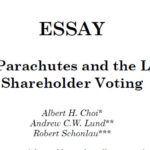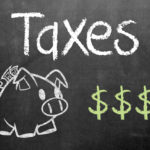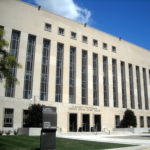Essays Category
Golden Parachutes and the Limits of Shareholder Voting
Jan. 21, 2020—Albert H. Choi, Andrew C.W. Lund & Robert Schonlau | 73 Vand. L. Rev. 223 (2020) | With the passage of the Dodd-Frank Wall Street Reform and Consumer Protection Act in 2010, Congress attempted to constrain change-in-control payments (also known as “golden parachutes”) by giving shareholders the right to approve or disapprove such payments on...
You Get What You Pay For: An Empirical Examination of the Use of MTurk in Legal Scholarship
Oct. 11, 2019—Robertson & Yoon | 72 Vand. L. Rev. 1633 (2019) | In recent years, legal scholars have come to rely on Amazon’s Mechanical Turk (“MTurk”) platform to recruit participants for surveys and experiments. Despite MTurk’s popularity, there is no generally accepted methodology for its use in legal scholarship, and many questions remain about the validity...
Disclosing Prosecutorial Misconduct
Jan. 28, 2019—Disclosing-Prosecutorial-Misconduct Prosecutorial misconduct in the form of Brady violations continues to plague the criminal justice system. Brady misconduct represents a fundamental breakdown in the adversarial process, denying defendants a fair trial and undermining the legitimacy of the criminal justice system. Commentators have responded by proposing a range of reforms to increase Brady compliance. Yet these...
The Trouble with Corporate Conscience
Oct. 19, 2018—The-Trouble-with-Corporate-Conscience ABSTRACT: Accomplished corporate law scholars claim that modern businesses need an infusion of morality. Disappointed by conventional regulatory responses to recurring corporate scandal, these scholars argue that corporate conscience provides a more fruitful path to systemic economic reform. In Burwell v. Hobby Lobby, which held that for-profit businesses can claim religious exemptions from general...
The Political Economy of Corporate Exit
May. 22, 2018—The-Political-Economy-of-Corporate-Exit ABSTRACT Corporate political activity is understood to include financial contributions, lobbying efforts, participation in trade groups, and political advertising, all of which give corporations a “voice” in public decisionmaking. This Essay contends that the accepted definition of corporate political activity overlooks the importance of “exit.” Corporations do not need to spend money to exert...
Private Benefits in Public Offerings: Tax Receivable Agreements in IPOs
Apr. 18, 2018—Private-Benefits-in-Public-Offerings-Tax-Receivable-Agreements-in-IPOs ABSTRACT Historically, an initial public offering (“IPO”) was a process whereby a company sold all of its underlying assets to the public. A new tax innovation, the “tax receivable agreement” (“TRA”), creates private tax benefits in public offerings by allowing pre-IPO owners to effectively keep valuable tax assets for themselves while selling the rest...
The Constitutional Case for Chevron Deference
Apr. 18, 2018—The-Constitutional-Case-for-Chevron-Deference ABSTRACT Prominent figures in the legal world have recently attacked the doctrine of Chevron deference, suggesting that Chevron is unconstitutional because it interferes with a court’s duty to exercise “independent judgment” when interpreting statutes. This Essay shows that Chevron’s critics are mistaken. Chevron deference, properly understood, does not prevent courts from interpreting statutes. An...
The Shifting Tides of Merger Litigation
Mar. 13, 2018—The-Shifting-Tides-of-Merger-Litigation ABSTRACT In 2015, Delaware made several important changes to its laws concerning merger litigation. These changes, which were made in response to a perception that levels of merger litigation were too high and that a substantial proportion of merger cases were not providing value, raised the bar, making it more difficult for plaintiffs to...
Decoding Guilty Minds: How Jurors Attribute Knowledge and Guilt
Jan. 18, 2018—Decoding Guilty Minds ABSTRACT A central tenet of Anglo-American penal law is that in order for an actor to be found criminally liable, a proscribed act must be accompanied by a guilty mind. While it is easy to understand the importance of this principle in theory, in practice it requires jurors and judges to decide what...
Saving the Political Consensus in Favor of Free Trade
Apr. 20, 2017—Saving the Political Consensus in Favor of Free Trade ABSTRACT 2016 was the year that the political consensus in favor of liberalized international trade collapsed. Today, across the world, voters’ belief that international trade agreements lead to economic inequality threatens to derail ratification of the next generation of trade agreements and undo the substantial gains...
Terrorist Speech on Social Media
Mar. 21, 2017—Terrorist Speech on Social Media ABSTRACT The presence of terrorist speech on the internet tests the limits of the First Amendment. Widely available cyber terrorist sermons, instructional videos, blogs, and interactive websites raise complex expressive concerns. On the one hand, statements that support nefarious and even violent movements are constitutionally protected against totalitarian-like repressions of...
The Management of Staff by Federal Court of Appeals Judges
Mar. 21, 2016—The Management of Staff by Federal Court of Appeals Judges ABSTRACT Federal court of appeals judges have staffs consisting usually of a secretary and four law clerks; some judges have externs as well (law students working part time without pay). These staffs are essential, given judicial workloads and judges’ limitations. Yet not much is known about how the...
Curb Your Enthusiasm for Pigovian Taxes
Nov. 23, 2015—Curb Your Enthusiasm for Pigovian Taxes ABSTRACT Pigovian (or “corrective”) taxes have been proposed or enacted on dozens of harmful products and activities: carbon, gasoline, fat, sugar, guns, cigarettes, alcohol, traffic, zoning, executive pay, and financial transactions, among others. Academics of all political stripes are mystified by the public’s inability to see the merits of...
In Praise of Ex Ante Regulation
Nov. 23, 2015—In Praise of Ex Ante Regulation ABSTRACT Timing is an important consideration in regulatory design. Corrective taxes are usually imposed before or contemporaneously with the harmful activity they are aimed at preventing, while tort awards are assessed ex post, in its aftermath. Patents and research grants both can encourage innovation, but patents pay off only...
Siblings in Law
Apr. 27, 2012—Siblings in Law Legal regulation of the family focuses on two canonical relationships: marriage and parenthood. Courts, legislatures, and scholars routinely take family law’s concentration on just two family ties to be so commonsensical as to require no explicit discussion or explanation. Yet marriage and parenthood are not the only family relationships that can be...














